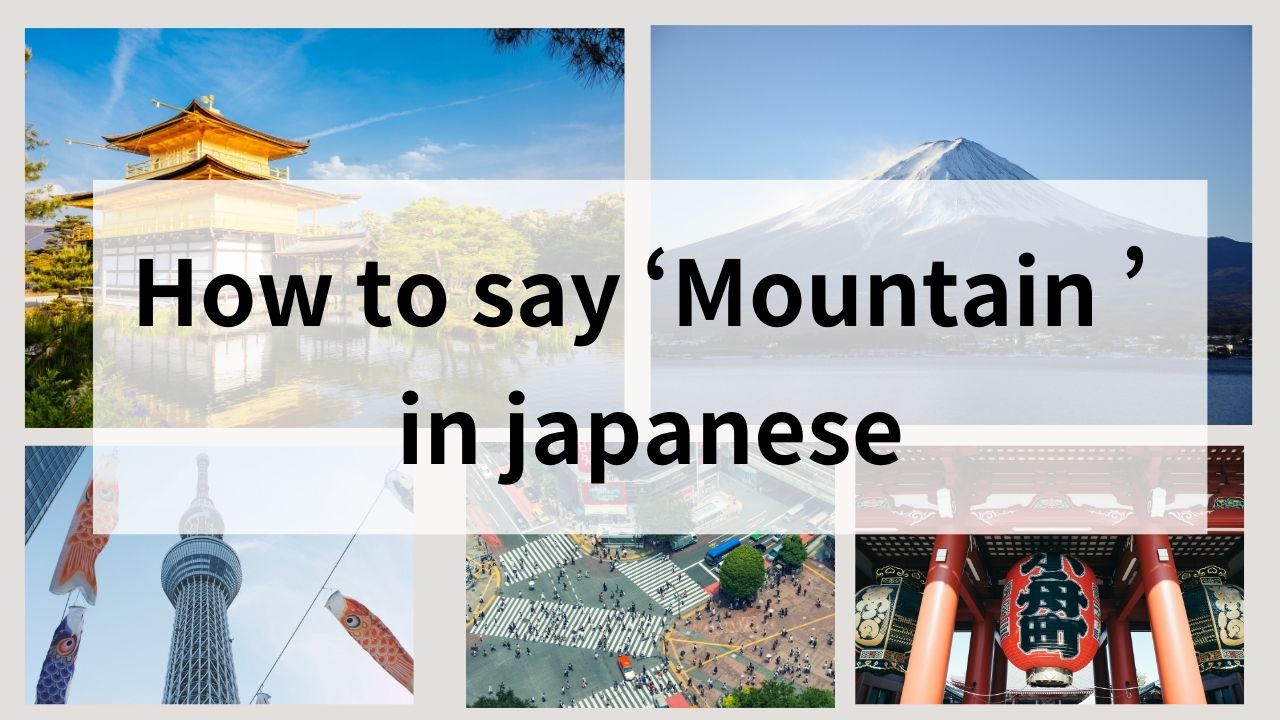Are you curious about how to say “mountain” in Japanese? The concept of mountains holds significant cultural and symbolic meanings in Japan, from nature to spirituality. This guide will explore the Japanese word for “mountain,” its cultural significance, and practical applications.
How Do You Say “Mountain” in Japanese?
The Japanese word for “mountain” is 山 (yama). This term is widely recognized and used in both casual and formal contexts. Mountains are a prominent part of Japan’s landscape and culture, often associated with beauty, spirituality, and nature.
The Japanese Word for Mountain: Yama (山)
“Yama” is a term used to describe mountains and appears in various phrases and contexts. For example:
- 山の景色 (Yama no keshiki): “Mountain scenery.”
- 山登り (Yama nobori): “Mountain climbing.”
- 山岳信仰 (Sangaku shinkō): “Mountain worship.”
Kanji for Mountain: 山
The kanji for mountain, 山, is commonly used in literature, traditional contexts, and everyday language. This character symbolizes the physical and spiritual presence of mountains in Japan. The primary reading for this kanji is やま (Yama), but it also appears in compound words.
Examples of words containing the kanji 山 include:
- 富士山 (Fuji-san): “Mount Fuji,” Japan’s most iconic mountain.
- 山脈 (Sanmyaku): “Mountain range.”
- 山頂 (Sanchō): “Mountain summit.”
This kanji is often associated with nature and the majestic beauty of mountains. Recognizing these patterns can help learners understand the nuanced use of 山 in Japanese.
Does “Mountain” Work in Japanese?
The English word “mountain” is generally understood in Japan, especially among younger generations or those familiar with outdoor activities and nature. However, its recognition might be less universal among older individuals or in more traditional contexts. A 5-point scale rates its comprehension as:
- Rating: 4 – Generally understood (60-80% of people)
If clarity is crucial, using the Japanese term やま (Yama) is recommended. While “mountain” may be understood in certain contexts, “yama” ensures effective communication.
The Cultural Significance of Mountains in Japan
Mountains hold a revered place in Japanese culture, symbolizing strength, endurance, and spirituality. They are often regarded as sacred places, associated with various deities and spiritual practices.
Mountains as Sacred Spaces
Many mountains in Japan are considered sacred, with rituals and pilgrimages taking place in their honor. For example, 富士山 (Fuji-san) is not only a natural wonder but also a spiritual symbol, attracting pilgrims and tourists alike.
Mountains in Japanese Folklore and Mythology
Mountains appear frequently in Japanese myths and stories, often representing mystery and the divine. They are sometimes linked to gods and spirits, enhancing their mystical qualities.
In addition to traditional associations, mountains play a significant role in modern Japanese culture, particularly in art and literature. This connection emphasizes the enduring influence of mountains in various aspects of Japanese life.
- 山姥 (Yamanba): A character from folklore, often depicted as a mountain witch, representing the mysterious nature of mountains.
- 君の名は (Your Name): This popular film features stunning mountain landscapes that symbolize the connection between characters and nature.
- 千と千尋の神隠し (Spirited Away): The film showcases scenes set in mountainous regions, highlighting their beauty and significance.
These examples demonstrate how mountains continue to represent mystery, spirituality, and a connection to nature, bridging traditional folklore and modern storytelling.
Differences Between Mountains in Japan and Overseas
There can be subtle differences in how “mountain” is perceived in Japan versus Western cultures. In Japan, “yama” (山) often refers to mountains that are not only physically imposing but also deeply spiritual. Meanwhile, in Western contexts, “mountain” may focus more on outdoor activities such as hiking and skiing. Understanding these cultural nuances can help avoid confusion, especially when discussing nature in creative or professional settings.
Practical Applications of “Mountain” in Japanese
Learning how “mountain” is used in Japanese can help you navigate conversations, understand idioms, and recognize its presence in Japanese culture.
Talking About Mountains in Daily Conversation
Here are some examples of how “yama” is used in everyday conversation:
- 山が好きです (Yama ga suki desu): “I like mountains.”
- 山に登りたい (Yama ni noboritai): “I want to climb a mountain.”
Mountain-Related Idioms or Expressions
While there are relatively few specific idioms involving “yama,” the concept of mountains is often associated with challenges, strength, and beauty in Japanese culture. Here are some idioms, phrases, and expressions that incorporate or symbolize mountains:
- 山あり谷あり (Yama ari tani ari): Literally “there are mountains and valleys,” this phrase signifies the ups and downs of life.
- 山を動かす (Yama o ugokasu): “To move mountains,” meaning to achieve something difficult.
- 登山 (Tozan): “Mountain climbing,” a popular recreational activity in Japan.
- 山の神 (Yama no kami): “God of the mountain,” referring to the spiritual beings associated with mountains.
- 山の幸 (Yama no sachi): “Mountain blessings,” referring to the natural bounty found in mountainous areas.
These idioms and expressions reflect the deep cultural and aesthetic appreciation of mountains in Japan, often tied to themes of strength, beauty, and spirituality. By learning these phrases, you can gain a deeper understanding of how mountains are interwoven with Japanese language and values.
Mountains in Japanese Cuisine or Products
Mountains also prominently feature in Japanese cuisine and products, showcasing their aesthetic appeal and cultural significance. Here are some notable examples:
- 信州そば (Shinshu soba): A type of buckwheat noodle from the mountainous region of Nagano, known for its rich flavor and texture.
- 山椒 (Sanshō): A spice derived from the prickly ash tree, often used in mountain cuisine for its unique flavor.
- 高原野菜 (Kōgen yasai): “Highland vegetables,” which thrive in the cooler mountain climate, known for their freshness and taste.
These examples highlight how mountains are not only visually significant but also culturally important in Japanese cuisine, adding richness and depth to both traditional and modern dishes.
FAQs
Here are some frequently asked questions about mountains in Japanese culture and language.
Are Mountains Popular in Japan?
Yes, mountains are highly regarded in Japan, often associated with natural beauty and spiritual significance. They are frequently visited for recreation, pilgrimage, and appreciation of nature.
How Do You Write “Mountain” in Japanese?
The word “mountain” can be written in three different scripts in Japanese: hiragana, katakana, and kanji. Each script serves different purposes depending on the context and formality. Here’s a breakdown:
- Hiragana (やま, Yama):
Hiragana is the most commonly used script for “mountain” in casual writing or when teaching children. It is simple and easy to read, making it ideal for everyday use. - Katakana (ヤマ, Yama):
Katakana is rarely used for “mountain,” but it may appear in stylistic contexts, such as advertisements, product names, or when emphasizing the word in text. - Kanji (山, Yama):
Kanji is the most formal and traditional way to write “mountain.” It is often used in literature, official documents, and cultural contexts. The kanji itself conveys a sense of majesty and strength.
Choosing which script to use depends on the tone, audience, and purpose of your communication. Understanding these variations can enhance both your written and spoken Japanese skills.
Conclusion
Mountains, or “yama” in Japanese, are more than just geographical features—they symbolize strength, beauty, and cultural significance. By understanding their role in Japanese language and traditions, you can deepen your appreciation for these majestic formations and their place in Japanese society.








